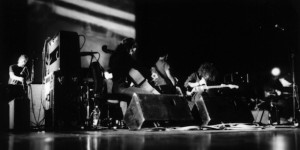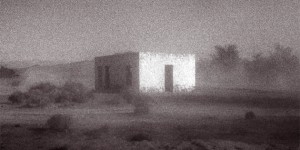Montreal's Ought find the right time and place
by Cam Lindsay
September 15, 2015
The post-punk quartet talk the metaphysical and material making of their new album.
Not every musician expects to tour the world and have a universally praised album that quickly gets the Pitchfork Best New Music seal of approval. So when it happened to Montreal’s Ought in 2014 with their debut, More Than Any Other Day, they were a bit perplexed.
“We had no expectations of what the first record would do,” admits drummer/violinist Tim Keen. “I just didn’t even understand the mechanics of how a record gets reviewed or anything like that. I just expected to put the record out, play a couple of shows, and go back to my everyday life.”
With their sophomore release Sun Coming Down imminent, Keen and company now know what to expect, but even still, knowing that they are no longer an obscure band didn’t change how Ought conducted business.
“I guess now there is some understanding that people will write about it, but in terms of making the record it wasn’t that different,” Keen adds. “It was faster, and more of a compressed version of the first album.”
On album number two, Ought have maintained the same intensity and ambition as their debut, pushing their wired, DIY punk fervour into various directions, ranging from stringently controlled rock song structures to sprawling and chaotic noise bursts at the drop of a hat. Timing had everything to do with it.
“More Than Any Other Day was written at night, and Sun Coming Down was written more during the day,” says bassist Ben Stidworthy. “I say it because I think there is more of a metaphysical explanation, but also a material one, because the first record was written over a long period of time. We made it while we were working and in school, making time to practice twice a week. The second record was written after six months of intense touring, and we had given ourselves a certain amount of time to do it, and it’s basically all we did every day in the winter time. I think surely that it’s indicative of a time and a place.”
One of Ought’s most endearing traits that continues with Sun Coming Down is the socially aware lyrical wordplay of singer/guitar Tim Darcy (née Beeler), converting mundane thoughts and everyday maxims into anthemic one-liner chants. On “Beautiful Blue Sky,” for instance, Darcy spins familiar phrases like “How’s the family?” and “Fancy seeing you here” into repetitive tools that become too irresistible not to holler out. Of course, there is a reason for it.
“All of those things that are being shouted are in the Hallmark card sense of being polar opposite, double entendres, where theoretically they should be imbued of meaning but often feel vacuous,” Darcy admits. “That part of the song is interesting because I’ve noticed people trying to do it, and I don’t do it exactly the same way every time, which I’m sure is not conducive to singing along to that section.”
Which brings us to the point where Ought reveal they aren’t quite as serious as their reputation often suggests (they formed the band during the 2012 Quebec student protests and their label was founded by the anti-capitalist crew in Godspeed You! Black Emperor). They especially love to watch their fans sing along and get the lyrics all wrong.
“Sometimes we see this very enjoyable thing where you can see on their faces that people haven’t heard the song before but they have this strong desire to sing along,” explains Keen. “It often happens in countries where English isn’t their first language, but it does happen in America as well. The first repetition is people forming their mouths into shapes that are vaguely the words, and eventually they catch up. But I think it’s very funny because it doesn’t even feel like it’s related to speech. It’s just mouthing imitation. It’s very enjoyable to watch.”
Tags: Music, Cancon, Featured, Interviews, constellation records, godspeed you black emperor, Ought
Featured Image via: Colin Medley





